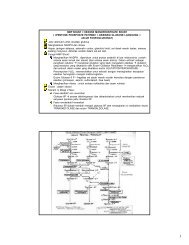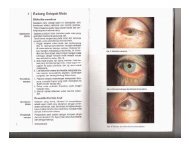International Handbook of Clinical Hypnosis - E-Lib FK UWKS
International Handbook of Clinical Hypnosis - E-Lib FK UWKS
International Handbook of Clinical Hypnosis - E-Lib FK UWKS
You also want an ePaper? Increase the reach of your titles
YUMPU automatically turns print PDFs into web optimized ePapers that Google loves.
MEMORY AND HYPNOSIS 57<br />
technical and clinical concerns. As argued elsewhere see McConkey & Sheehan,<br />
1995), this is <strong>of</strong>ten a matter <strong>of</strong> pr<strong>of</strong>essional judgement and such a judgement must<br />
be guided by familiarity with relevant ethcial principles and the application <strong>of</strong><br />
pr<strong>of</strong>essional competency.<br />
Consider, for a moment, two speci®c instances, one in the clinical setting and<br />
one in the forensic setting, where the issue <strong>of</strong> memory accuracy is <strong>of</strong>ten <strong>of</strong><br />
paramount importance.<br />
In clinical practice, hypnosis typically relates to a range <strong>of</strong> applications which<br />
can involve major issues for practitioners when hypnosis is used in a therapeutic<br />
way. Factors requiring attention relate to the perceived association between emotion<br />
and recall in hypnosis, the implication <strong>of</strong> falsi®cations occurring in hypnosis, the<br />
possibility that con®rmation or suggestions <strong>of</strong> abuse may be inadvertently communicated<br />
to the client, and interpretations <strong>of</strong> the `evidence' <strong>of</strong> a session being drawn<br />
which could be inconsistent with scienti®c data. <strong>Clinical</strong> concern can be wider than<br />
the pursuit <strong>of</strong> client `improvement.'<br />
In other settings, such as the forensic one, similar factors are involved. They<br />
primarily relate to the choice <strong>of</strong> the person to be hypnotized, the role <strong>of</strong> emotion in<br />
recall again), the possibility <strong>of</strong> deception, and the civil rights <strong>of</strong> the person being<br />
hypnotized. Each <strong>of</strong> these factors is relevant to both settings but takes on a<br />
particular appearance in different social contexts. The role <strong>of</strong> emotion is distinctly<br />
important in the forensic setting, for instance, where the welfare <strong>of</strong> a client the<br />
person being hypnotized) can be threatened by the forensic procedures the practitioner<br />
adopts. A person who is severely distressed at the point <strong>of</strong> retrieving<br />
possibly) relevant information, for instance, raises the problem <strong>of</strong> whether further<br />
stress is justi®ed to retrieve more information that may or may not have a useful<br />
legal purpose.<br />
These general pr<strong>of</strong>essional considerations are nearly always relevant, but have<br />
particular relevance to some cases. Legitimate questions can <strong>of</strong>ten be raised as to<br />
whether the use <strong>of</strong> hypnosis has a timely investigative purpose and where the<br />
balance <strong>of</strong> technical versus clinical concerns is critical. Decisions to proceed to<br />
explore the association between hypnosis and memory can <strong>of</strong>ten be quite dif®cult,<br />
and if hypnosis is used clear support for moving ahead must be reliably evident or<br />
forthcoming.<br />
Where the association between memory and hypnosis is concerned, a special<br />
consideration both technically and clinically) is the reliability <strong>of</strong> the memory<br />
reporting. In a technical sense, there are speci®c procedures which can aim to<br />
determine whether reporting is reliable independent checking <strong>of</strong> memory events<br />
reported in hypnosis, for example), but clinical and pr<strong>of</strong>essional factors are also<br />
relevant. Where personal reputations can be damaged, for instance, by a recovered<br />
recollection <strong>of</strong> sexual abuse the practitioner must make every effort to ensure that<br />
the memory retrieved is accurate. The future welfare <strong>of</strong> the client concerned and<br />
that <strong>of</strong> others accused <strong>of</strong> the act <strong>of</strong> abusing, for example, depends on the strict<br />
enforcement <strong>of</strong> ethical guidelines for recovering the memory in question. For











![SISTEM SENSORY [Compatibility Mode].pdf](https://img.yumpu.com/20667975/1/190x245/sistem-sensory-compatibility-modepdf.jpg?quality=85)





